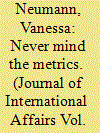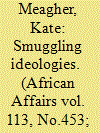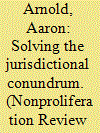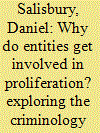|
|
|
Sort Order |
|
|
|
Items / Page
|
|
|
|
|
|
|
| Srl | Item |
| 1 |
ID:
132531


|
|
|
|
|
| Publication |
2014.
|
| Summary/Abstract |
Afghanistan has been the global epicenter of heroin production for the past decade. Heroin networks and drug lords present a principal impediment to security, state building, and democratic governance. Beyond the national boundaries, Afghan-originated heroin creates enormous challenges for international security by financing terrorism, instigating corruption, killing nearly 100,000 users worldwide every year, undermining public order, and debilitating economic development. The devastating impacts of the Afghan heroin trade have spilled over into Southwest Asia, Central Asia, Russia, China, the Balkans, and Europe. Because Turkey stands on the shortest transit pathway between Southwest Asia and Europe, it is intensively exposed to illicit flows of Afghan heroin along the Balkan Route. Transnational crime syndicates have been exploiting Turkish territories for decades for the purpose of trafficking heroin to European markets. This paper discusses Afghan heroin as an international security conundrum. It further seeks to explore the dimensions of the threat in Turkey, new patterns in heroin trafficking, and profiles and operation modes of transnational syndicates. The analyses are based upon the scrutiny of important case files, national seizure database, and annual KOM provincial questionnaires. In conclusion, the paper puts forward policy recommendations for security elites both in Turkey and in other states affected by the illicit trade of Afghan heroin.
|
|
|
|
|
|
|
|
|
|
|
|
|
|
|
|
| 2 |
ID:
138414


|
|
|
|
|
| Summary/Abstract |
Refugee camps are often treated as incubators of social unrest, violence, terrorism, and illicit trade. This provokes their overseers in the United Nations (UN) and other relief agencies to conduct frequent social engineering to enhance the camps’ legibility. Hence, we see orderly, perpendicular rows, standardized units from redistricting to the allocation of diapers, and so forth—all of the follies of high modernism that James Scott predicted in "Seeing Like a State," but writ small. Indeed, my qualitative research from the Za’atari refugee camp, located in Jordan along the Syrian border, indicates that refugees, especially middle-class ones like Syria’s, rebel against uniformity—or what Scott describes as “metis”—and seek to recreate their domiciles as best they can from the meager canvas tents and campers allotted to them. Put simply, they see their surroundings more as the disorderly “sidewalk ballet” of Jane Jacobs’ Greenwich Village than the high modernist yet sterile functionalism of Robert Moses. This holds important policy implications for the future of how we devise refugee camps, which increasingly resemble small cities; how we settle internally displaced persons (IDPs); and how we deal with the aftermath of mass population displacements. From direct cash transfers to the districting of refugees, some bureaucratic flexibility is required but so is an acknowledgement and embrace of refugees’ do-it-yourself ethos that is rooted in their resistance to authority and trauma from violence. Drawing from the literature in social anthropology and political science, this article presents new evidence from Za’atari that disputes the utility of a high modernist approach to the social engineering of large displaced populations.
|
|
|
|
|
|
|
|
|
|
|
|
|
|
|
|
| 3 |
ID:
168438


|
|
|
|
|
| Summary/Abstract |
In 2004, the United Nations Security Council adopted resolution 1540, which acknowledged the non-state acquisition of weapons of mass destruction as a security threat and called on member states to implement “appropriate effective” domestic trade controls. The United States, however, has both promoted the multilateral implementation of strategic trade controls but has also increasingly resorted to extraterritorial enforcement of its counterproliferation rules. How can a multilateral, norms-based international regime like 1540 contend with extraterritorial enforcement based on national interests? We argue that increased U.S. extraterritorial counterproliferation policies are a consequence of the inconsistent implementation of resolution 1540, adaptive and resilient proliferation networks, and a history of expanding legal interpretations of jurisdiction. We find that while U.S. extraterritorial enforcement can effectively disrupt networks hiding in overseas jurisdictions, doing so creates disincentives for states to implement 1540 obligations and undermines broader nonproliferation objectives.
|
|
|
|
|
|
|
|
|
|
|
|
|
|
|
|
| 4 |
ID:
138409


|
|
|
|
|
| Summary/Abstract |
Measuring and mapping human trafficking are challenging for several reasons and therefore do not lead to effective counter-trafficking strategies. Understanding the drivers of human migration, however, is a much more promising approach for developing policies with risk-mitigating strategies. Insofar as the patterns of human migration are intertwined with other aspects of illicit trade, they can serve as an early warning signal of vulnerabilities in the global trade system for criminal activity. Tracking the financial links between human trafficking and other crimes provides various options for effective degradation and disruption of illicit trafficking networks.
|
|
|
|
|
|
|
|
|
|
|
|
|
|
|
|
| 5 |
ID:
134346


|
|
|
|
|
| Summary/Abstract |
This article explores shifting perspectives on African clandestine economies. Previously condemned as products of clientelism and corruption, clandestine economies are attracting renewed interest for their developmental potential in weak state contexts. Focusing on systems of illicit cross-border trade in East and West Africa, this article shows that more favourable views of clandestine trading activities are driven more by their compatibility with liberal reform agendas than by their positive contribution to local development. Indeed, the optimistic turn in perspectives on illicit African trade glosses over its increasingly negative impact on local security and development. While discourses of violence and criminalization were used to characterize the largely peaceful cross-border trading systems in West Africa in the 1990s, new discourses of hybrid governance and state building are used to frame the more violent and socially disruptive cross-border trading complexes of East Africa in the 2000s.
|
|
|
|
|
|
|
|
|
|
|
|
|
|
|
|
| 6 |
ID:
162684


|
|
|
|
|
| Summary/Abstract |
Over the past two decades, the United States has increasingly turned to targeted sanctions and export restrictions, such as those imposed against Iran and North Korea, in order to curb the spread of weapons of mass destruction. One vexing problem, however, is how to contend with jurisdictional hurdles when the violations occur overseas, in countries that are unable or unwilling to assist US enforcement efforts. To solve this problem, US prosecutors are turning to strategies with significant extraterritorial implications— that is, exercising legal authority beyond national borders. One such tool is to use civil legal procedures to seize assets linked to sanctions or export-control violations in jurisdictions that lack cooperative arrangements with US enforcement agencies. While this may be an attractive strategy to bolster enforcement efforts against overseas illicit procurement, using such tools is not without consequence. This article explores the political, legal, and technical implications of enforcing extraterritorial controls against overseas non-state actors by exploring the recent uses of civil-asset forfeiture against Iranian and North Korean procurement networks.
|
|
|
|
|
|
|
|
|
|
|
|
|
|
|
|
| 7 |
ID:
157824


|
|
|
|
|
| Summary/Abstract |
This article seeks to provide an original approach to weapons of mass destruction (WMD)-related illicit trade by drawing on criminology and focusing on the transactional level. Specifically, the article discusses the “rational-choice” model as a way to understand an entity’s involvement in illicit trade, and considers also the limitations of this approach, as well as the role that opportunity plays in an actor’s decision to engage in illicit trade. The article draws the conclusion that the prospects of deterring illicit trade using export controls and related criminal sanctions are limited. Beyond the clear limitations of the rational-choice model, the prospects of deterring illicit WMD trade are limited by the low levels of certainty in export-control enforcement, something that the criminology literature suggests is of greater importance than severity of punishment in deterring crime. Nonproliferation successes are more likely to be found in further efforts to develop tools to address proliferation opportunities, an area that has already seen much work. Efforts to further raise illicit WMD-related trade from the realms of “invisible crime” are necessary, including further conceptual research on illicit trade.
|
|
|
|
|
|
|
|
|
|
|
|
|
|
|
|
|
|
|
|
|